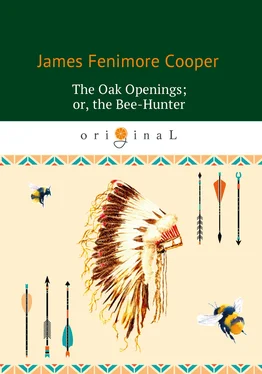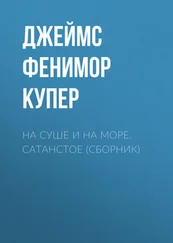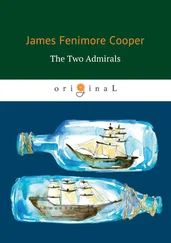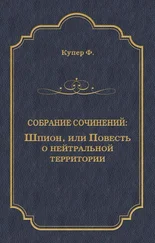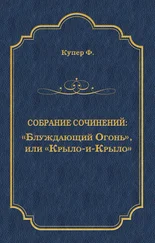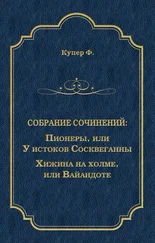“And yonder is a bear, if there be bears on earth!” exclaimed le Bourdon, who was not a little amused with Gershom’s account of his family, but who saw that the moment was now arrived when it would be necessary to substitute deeds for words. “There they come, in a drove, and they seem in earnest.”
This was true enough. No less than eight bears, half of which, however, were quite young, came tumbling over the logs, and bounding up toward the fallen tree, as if charging the citadel of the bees by preconcert. Their appearance was the signal for a general rally of the insects, and by the time the foremost of the clumsy animals had reached the tree, the air above and around him was absolutely darkened by the cloud of bees that was collected to defend their treasures. Bruin trusted too much to the thickness of his hide and to the defences with which he was provided by nature, besides being too much incited by the love of honey, to regard the little heroes, but thrust his nose in at the hole, doubtless hoping to plunge it at once into the midst of a mass of the sweets. A growl, a start backward, and a flourishing of the fore-paws, with sundry bites in the air, at once announced that he had met with greater resistance than he had anticipated. In a minute, all the bears were on their hind-legs, beating the air with their fore-paws, and nipping right and left with their jaws, in vigorous combat with their almost invisible foes. Instinct supplied the place of science, and spite of the hides and the long hair that covered them, the bees found the means of darting their stings into unprotected places, until the quadrupeds were fairly driven to rolling about on the grass in order to crush their assailants. This last process had some effect, a great many bees being destroyed by the energetic rollings and tumblings of the bears; but, as in the tide of battle, the places of those who fell were immediately supplied by fresh assailants, until numbers seemed likely to prevail over power, if not over discipline. At this critical instant, when the bears seemed fatigued with their nearly frantic saltations, and violent blows upon nothing, le Bourdon deemed it wise to bring his forces into the combat. Gershom having been apprised of the plan, both fired at the same instant. Each ball took effect; one killing the largest of all the bears, dead on the spot, while the other inflicted a grievous wound on a second. This success was immediately followed by a second discharge, wounding two more of the enemy, while Ben held the second barrel of his “shot-gun” in reserve. While the hurt animals were hobbling off, the men reloaded their pieces; and by the time the last were ready to advance on the enemy, the ground was cleared of bears and bees alike, only two of the former remaining, of which one was already dead and the other dying. As for the bees, they followed their retreating enemies in a body, making a mistake that sometimes happens to still more intelligent beings; that of attributing to themselves, and their own prowess, a success that had been gained by others.
The bee-hunter and his friend now set themselves at work to provide a reception for the insects, the return of which might shortly be expected. The former lighted a fire, being always provided with the means, while Gershom brought dry wood. In less than five minutes a bright blaze was gleaming upward, and when the bees returned, as most of them soon did, they found this new enemy intrenched, as it might be, behind walls of flame. Thousands of the little creatures perished by means of this new invention of man, and the rest soon after were led away by their chiefs to seek some new deposit for the fruits of their industry.
The sad butterfly,
Waving his lackered wings, darts quickly on,
And, by his free flight, counsels us to speed
For better lodgings, and a scene more sweet,
Than these dear borders offer us to-night.
Simms
It was noon before Ben and Gershom dared to commence the process of cutting and splitting the tree, in order to obtain the honey. Until then, the bees lingered around their fallen hive, and it would have been dangerous to venture beyond the smoke and heat, in order to accomplish the task. It is true, le Bourdon possessed several secrets, of more or less virtue, to drive off the bees when disposed to assault him, but no one that was as certain as a good fire, backed by a dense column of vapor. Various plants are thought to be so offensive to the insects, that they avoid even their odor; and the bee-hunter had faith in one or two of them; but none of the right sort happened now to be near, and he was obliged to trust, first to a powerful heat, and next to the vapor of damp wood.
As there were axes, and wedges, and a beetle in the canoe, and Gershom was as expert with these implements as a master of fencing is with his foil, to say nothing of the skill of le Bourdon, the tree was soon laid open, and its ample stores of sweets exposed. In the course of the afternoon the honey was deposited in kegs, the kegs were transferred to the canoe, and the whole deposited in the chiente. The day had been one of toil, and when our two bordermen sat down near the spring, to take their evening meal, each felt glad that his work was done.
“I believe this must be the last hive I line, this summer,” said le Bourdon, while eating his supper. “My luck has been good so far, but in troublesome times one had better not be too far from home. I am surprised, Waring, that you have ventured so far from your family, while the tidings are so gloomy.”
“That’s partly because you don’t know ME, and partly because you don’t know DOLLY. As for leaving hum, with anybody to kear for it, I should like to know who is more to the purpose than Dolly Waring? I haven’t no idee that even bees would dare get upon HER! If they did, they’d soon get the worst on’t Her tongue is all-powerful, to say nawthin’ of her arms; and if the so’gers can only handle their muskets as she can handle a broom, there is no need of new regiments to carry on this war.”
Now, nothing could be more false than this character; but a drunkard has little regard to what he says.
“I am glad your garrison is so strong,” answered the beehunter, thoughtfully; “but mine is too weak to stay any longer, out here in the openings. Whiskey Centre, I intend to break up, and return to the settlement, before the red-skins break loose in earnest. If you will stay and lend me a hand to embark the honey and stores, and help to carry the canoe down the river, you shall be well paid for your trouble.”
“Waal, I’d about as lief do that, as do anything else. Good jobs is scarce, out here in the wilderness, and when a body lights of one, he ought to profit by it. I come up here thinkin’ to meet you, for I heer’n tell from a voyager that you was abeeing it, out in the openin’s, and there’s nawthin’ in natur’ that Dolly takes to with a greater relish than good wild honey. ‘Try whiskey,’ I’ve told her a thousand times, ‘and you’ll soon get to like THAT better than all the rest of creation’; but not a drop could I ever get her, or Blossom, to swallow. It’s true, that leaves so much the more for me; but I’m a companionable crittur, and don’t think I’ve drunk as much as I want, unless I take it society-like. That’s one reason I’ve taken so mightily to you, Bourdon; you’re not much at a pull, but you an’t downright afeared of a jug, neither.”
The bee-hunter was glad to hear that all the family had not this man’s vice, for he now plainly foresaw that the accidents of his position must bring him and these strangers much in contact, for some weeks, at least. Le Bourdon, though not absolutely “afraid of a jug,” as Whiskey Centre had expressed it, was decidedly a temperate man; drinking but seldom, and never to excess. He too well knew the hazards by which he was surrounded, to indulge in this way, even had he the taste for it; but he had no taste that way, one small jug of brandy forming his supply for a whole season. In these days of exaggeration in all things, exaggeration in politics, in religion, in temperance, in virtue, and even in education, by putting “new wine into old bottles,” that one little jug might have sufficed to give him a bad name; but five-and-thirty years ago men had more real independence than they now possess, and were not as much afraid of that croquemitaine, public opinion, as they are to-day. To be sure, it was little to le Bourdon’s taste to make a companion of such a person as Whiskey Centre; but there was no choice. The man was an utter stranger to him; and the only means he possessed of making sure that he did not carry off the property that lay so much at his mercy, was by keeping near him. With many men, the bee-hunter would have been uneasy at being compelled to remain alone with them in the woods; for cases in which one had murdered another, in order to get possession of the goods, in these remote regions, were talked of, among the other rumors of the borders; but Gershom had that in his air and manner that rendered Ben confident his delinquencies, at the most, would scarcely reach bloodshed. Pilfer he might; but murder was a crime which he did not appear at all likely to commit.
Читать дальше
